Originally published, November, 2010
The Channel Islands captured my imagination during fifth grade, when I read Scott O’Dell’s Newbery Award-winning book, Island of the Blue Dolphins. The novel was about a Chumash girl who lived alone on one of the islands after her tribe was forcibly relocated to the mainland in the mid-1800s.
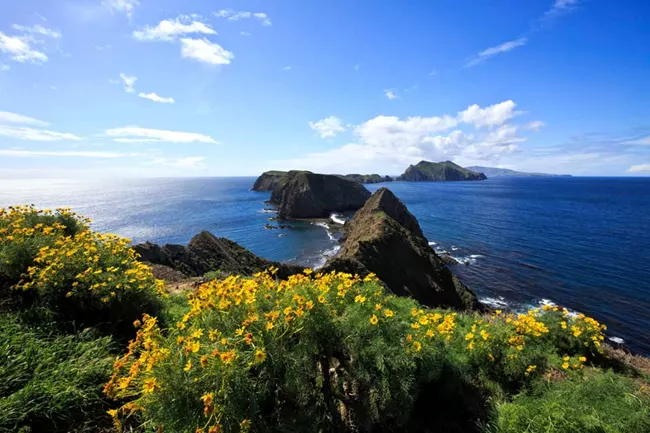
Inspiration Point on Anacapa Island in Channel Islands National Park, which is off the coast of southern California. Photo courtesy NPS
Now, as an adult, I’ve gotten to visit Santa Cruz, one of the five islands in Channel Islands National Park, which has been protected by the National Park Service since 1980. The Channel Islands can be reached from the marina at Ventura, California (or from the city of Oxnard) by boarding an Island Packers catamaran.
I took an Island Packer’s cruise to the island of Santa Cruz—a 9:00 to 5:00 day trip during mid-October. It takes an hour to reach the two landings: Scorpion Anchorage and Prisoners Harbor, and the trip is quite scenic: it’s not uncommon to spot sea lions sunbathing on one the anchored rafts along the way. And on the trip back to Ventura, I was lucky enough to see a pod of dolphins streaking alongside the catamaran.
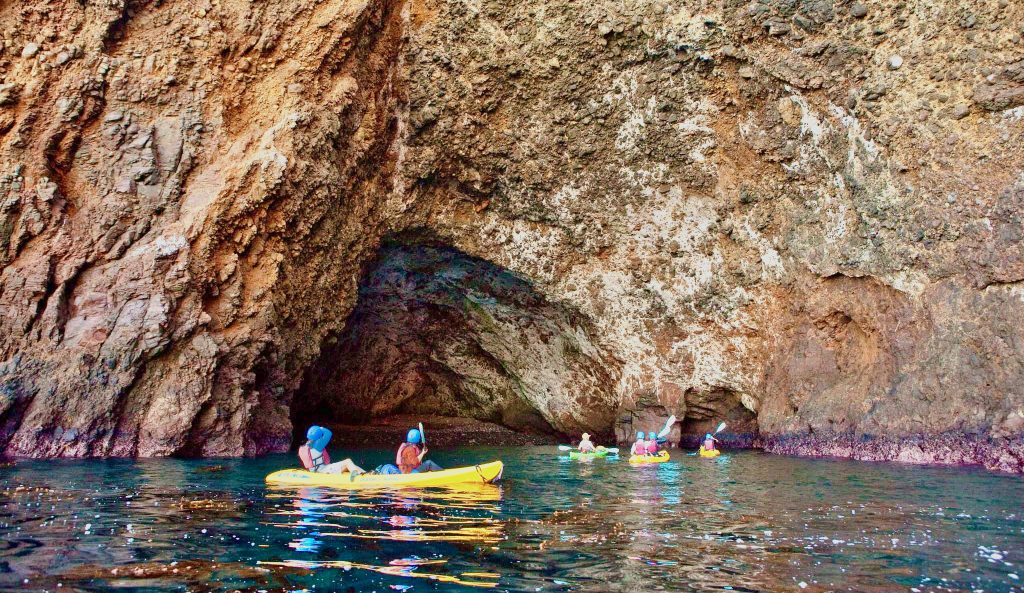
Experienced guides will show you how to paddle in the Pacific. Photo courtesy Channel Islands Adventure Company
Once you arrive on dry land, there are loads of Channel Island activities—although just sitting and taking in the glorious views of the ocean and the other islands should not be rushed. Here are just a few of the available activities:
- Hiking: There are 16 hikes of varying lengths and difficulty on the 24-mile long island, which is partly owned by the Nature Conservancy.
- Swimming: Beach access is at Scorpion Anchorage, Smuggler’s Cove, and Prisoners Harbor
- Snorkeling and diving: Explore kelp forests and sea caves. There are formidable sea urchins and colorful starfish to watch.
- Sea kayaking: You must bring your own kayak, rent one, or go with an outfitter.
- Camping: There’s a campground near Scorpion Anchorage on Santa Cruz).
- Birdwatching: The endemic Island Scrub Jay here lives nowhere else on the planet.
Kayaking Around Santa Cruz Island
I chose to spend much of my day at Santa Cruz on the water by joinning a guided sea kayak excursion with Channel Islands Expeditions. They provided individual top-seater kayaks, a wetsuit (sleeveless for ease of paddling), life vest, dry bags for clothes, and experienced guides who spend a lot of time in the park. (The National Park Service does not allow any tour operators to serve food, so you have to bring along your own food and water. Drinks and snacks are available for purchase on the Island Packers boat.)
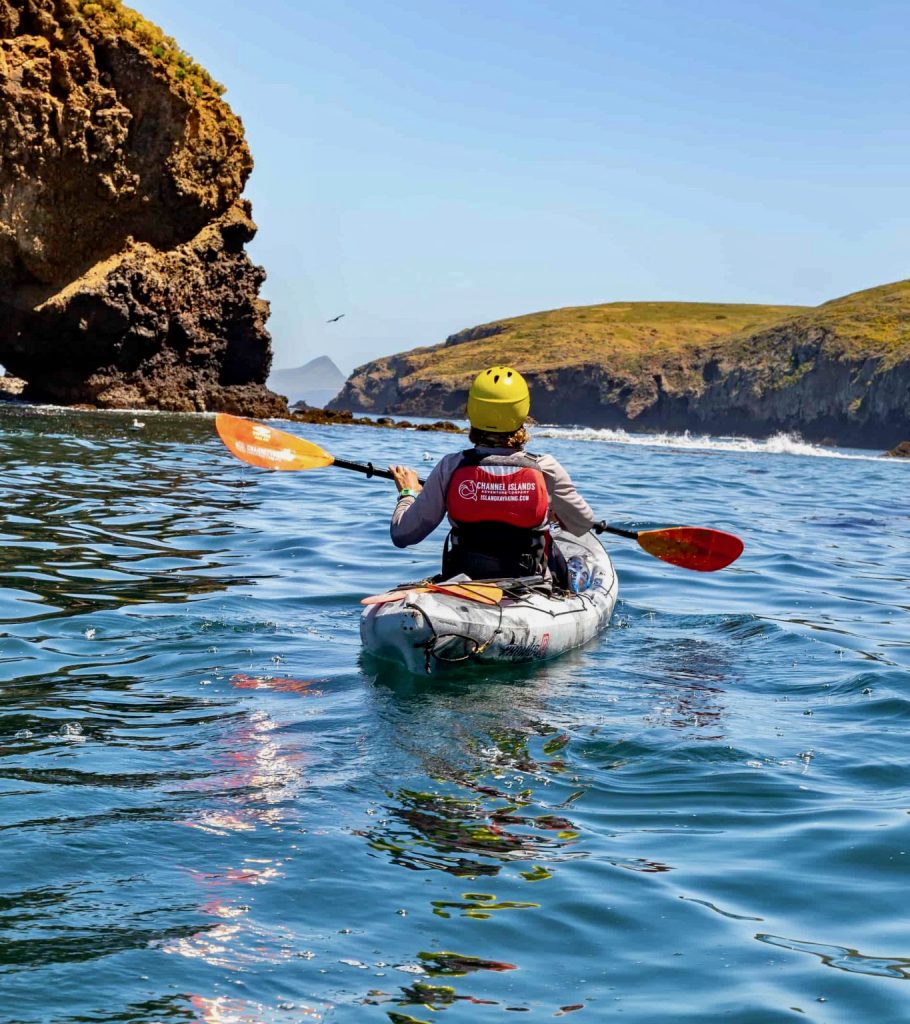
Paddling the Pacific’s Channel Islands
My group’s guides, Clay and Matt, asked the boat to drop us off at a lovely area a little west of Prisoners Harbor off Nature Conservancy land. They instructed us on safety, gave us paddling tips, and helped us suit up. Then off we went, paddling among the jagged shoreline and kelp forests around Santa Cruz.
The ocean was calm, and it wasn’t hard to approach the rock cliffs for up-close views of rocks crusted with starfish, barnacles, and limpets. Cliff pointed out the bright-orange garibaldi, California’s state fish. I never got a close look, but its color shone brilliantly from the water.
In some places, the kelp forests were so thick that I felt like I was paddling through sand. My paddle blades kept getting caught in the wavy strands of brown kelp or tangled amid the kelp’s air bladders. When that happened, we were told to slide the paddle gently upwards rather than trying to rip it away from the sea plants.
Adventures with Sea Lions
Shy harbor seals poked their heads above water to check out our kayak group, but if we got very close or make direct eye contact, they slid their round heads beneath the surface and disappeared in an instant.
The curious California sea lions were more bold. At one point when I was paddling a short distance from the others, I heard a sea lion blowing air as it surfaced right behind me. I was a little scared, but it didn’t come too close—and then it dove. A moment later, I heard the sea lion blow again, this time on the opposite side of my kayak. I said “hello there!” before it dove again. Our little game of tag when on for a few minutes, then the sea lion moved on to more interesting things—such as catching delicious fish!
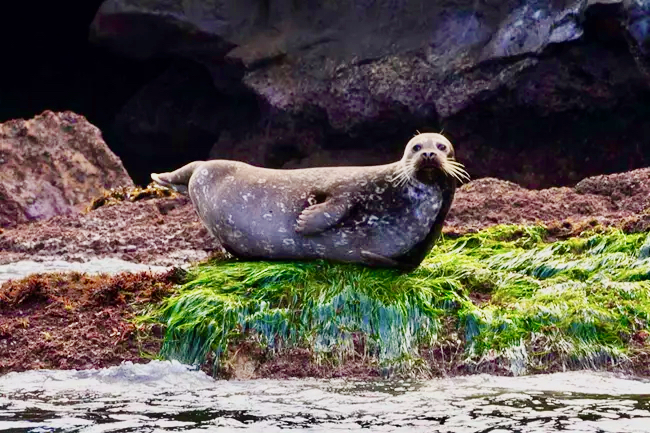
Harbor seals can be spotted on rocks near the water’s edge with their head and flippers elevated so they’ll be warmed by the sun. Photo courtesy of the National Park Service
Our group stopped at a rocky beach for lunch. It was a cloudy day with several rain showers while we were paddling, so when we got on land I was pretty chilly. (And a little seasick from paddling through some choppier waves. Who knew?) Fortunately, on land Clay and Matt unpacked our dry clothes, so our picnic was fairly comfortable and enjoyable.
Far too soon, it was time to leave this quiet adventure of paddling placidly amid the ocean wilds. It felt great to be propelling myself through the water, smelling the salt air, and watching the waves and the sky and the pelicans.
As someone who lives in a land-locked state, I just never tire of the miracle of the sea.
—Laurel Kallenbach, freelance writer and editor
What are the best kayaking spots you’ve visited? Leave a comment below.
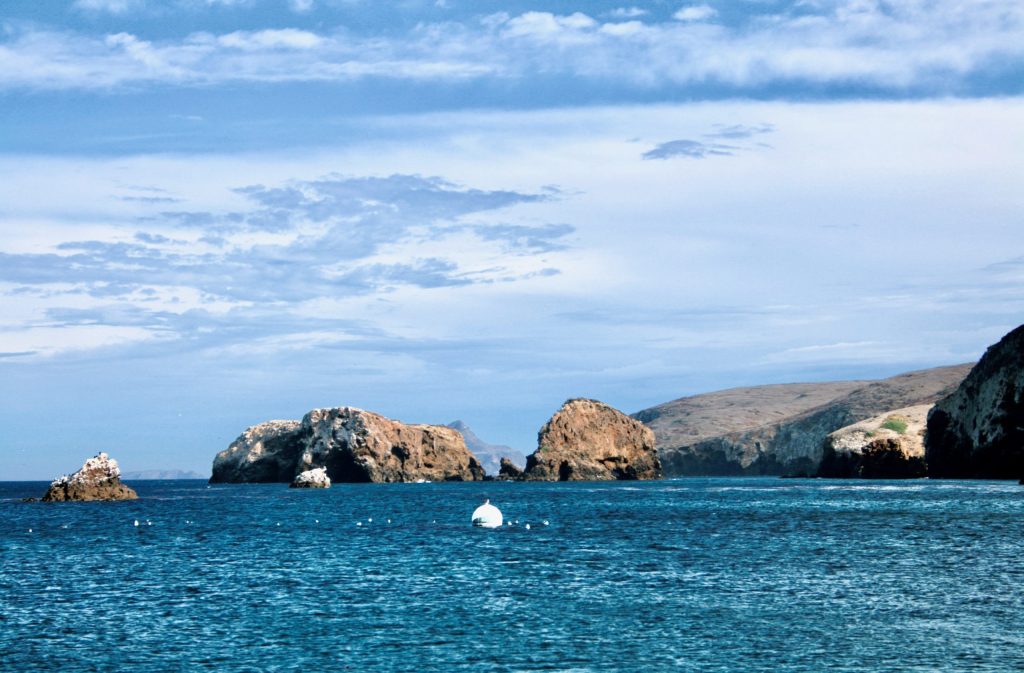
The island of Santa Cruz, located off southern California’s coast in the Channel Islands ©Laurel Kallenbach
Read more about my travels in America’s national parks and monuments:
- Snowshoeing in Rocky Mountain National Park
- Fossils Come Alive at Dinosaur National Monument
- 10 Reasons to Celebrate America’s National Parks
- Castles in the Utah Desert: Hovenweep National Monument
- Solar Power Lights Ft. McHenry Historic Monument
- Mesa Verde: An Archaeological Pilgrimage
- Sleep in a Sustainable Hotel in Mesa Verde National Park
- Treasures of Canyons of the Ancients National Monument
- Explore a ruined pueblo: Canyons of the Ancients National Monument
- Discover Painted Hand Pueblo in Canyons of the Ancients
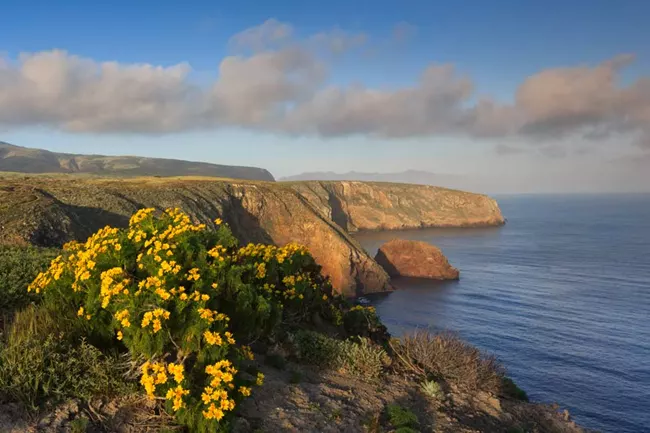
Cavern Point on Santa Cruz. Photo courtesy National Park Service

No, I haven’t visited the San Juans, but I was sea kayaking once before at Clayoquot Sound, Vancouver Island. It was beautiful too!
Gee, Laurel, you seem so bored! 🙂